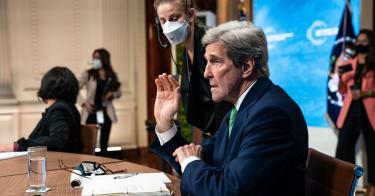Two weeks ago, according to the New York Times, Chinese State Councilor and Foreign Minister Wang Yi (王毅) told a virtual audience convened by the Council on Foreign Relations that cooperation with the U.S. on climate change depends on the U.S. approach to several hot-button Chinese interests.
For anyone following the way Beijing conducts diplomacy, this is no surprise. Connor Swank, an analyst at the Center for Advanced China Research, which systematically examines official Chinese statements, puts it this way: “Unfortunately, the notion that Beijing continues to seek concessions from the United States in return for China’s cooperation on climate change is very well-supported.”
Added Swank: “Chinese officials have been open, even brazen, in their efforts to link progress on climate issues to American behavior on other issues in bilateral relations.”
The question is whether the U.S. will give them anything, and what. It could be Taiwan.
>>> Protecting Taiwan Is Vital To Blocking Chinese Aggression In The Pacific
This column has been hopeful about where the Biden administration will take Taiwan policy. It’s got the people in place to maintain steady support, and it’s been good in its first few months—from TECRO Representative Bi-khim Hsiao’s (蕭美琴) presence at the President’s inauguration to last week’s support for Taiwan’s participation in the World Health Assembly. But Special Envoy John Kerry and his long-held passion for addressing climate change is the wildcard. In fact, we’ve seen this movie before. As Josh Rogin asserts in his new book, Chaos Under Heaven, the Obama administration’s too-little, too-late pushback on growing Chinese aggression can be traced directly back to the priority Obama attributed to cooperation with China on climate—when Kerry was Secretary of State.
If the Biden administration does give on Taiwan, don’t look for anything dramatic. Kerry has explicitly ruled out any linkage between climate change cooperation and other U.S. interests. National Security Adviser Jake Sullivan just did the same last week.
So look for the sort of changes that are deniable.
Does the next major arms sale to Taiwan slide into oblivion? Does the Biden administration make a cabinet-level visit to Taiwan or follow the precedent the Trump administration set with Undersecretary Keith Krach’s visit—the highest-ranking State Department visitor since 1979? Biden picked up the relay on Trump’s relaxation of U.S. government contact guidelines. That was great news. Do administration officials make full use of them? Even a half measure (the example of the Obama administration’s upgrade of F-16s that was sold as better than new jets comes to mind) might suffice to show the Chinese that the U.S. is ready to walk away.
Finally, look to the more complex set of issues surrounding the prospects for a free-trade agreement with Taiwan. The Biden National Security Council and State Department understand the logic of negotiating an FTA with Taiwan. USTR, however, may never get to yes, despite the progress Taiwan has made on U.S. interests on pork and beef. Former USTR Robert Lighthizer had his reasons for not getting there. We now know it obviously wasn’t beef and pork. It was steel, or trade deficits, or the U.S.-China phase one trade deal. If the Biden administration can’t commit to an FTA, Kerry and his climate crusade will likely be part of its evasion.
So why Taiwan?
One, because it is the U.S. policy Beijing cares about the most. A spokesman for the Chinese Foreign Ministry raised the connection between Taiwan policy and U.S.-China cooperation on other issues at the very moment Kerry was in China last month to talk about climate change.
Two, because if it wants Chinese cooperation, the administration is going to have to pick and choose. The thing Beijing cares most about after Taiwan is its technological and industrial dreams. Hard to imagine the administration conceding there. It is fully embracing a sort of techno-nationalism that is very much in fashion now in Washington. And even if it were inclined to backtrack on that, Congress is constitutionally empowered to get it back onside.
Other areas of the relationship, Beijing already discounts. It doesn’t like the statements about the plight of Uighurs, Hong Kong, or associated sanctions. But it deals with those issues as a public-relations exercise. And as for pulling back on U.S. naval operations off its shores or in the South China Sea, from Beijing’s perspective, that would be just the U.S. doing what it’s supposed to do. No climate cooperation in exchange for that.
>>> Why U.S.-Taiwan Relations Are Partnership for Freedom
It’s hard to put any faith in Beijing’s pledges, whether it is adherence to the Sino-British Joint Declaration on Hong Kong or the assurances Xi Jinping (習近平) made to Obama on cyber espionage and not militarizing the South China Sea. Given the way these things played out, in fact, he’s probably eager to reap the benefits of more pledges.
More importantly, however, is Kerry’s own eagerness for climate cooperation. There is no path to climate-change cooperation with China that does not involve a U.S. concession on other interests. If Kerry insists, the only question will be which one gets clipped. It could be Taiwan.
This piece originally appeared in the Taipei Times



